Top 10 Online Courses To Learn About Artificial Neural Networks
With AI revolutionizing the way businesses operate and having a major impact on people's lives, it is essential for aspiring people who want to embark on a ... read more...career in AI to have a well-rounded knowledge about neural networks, from the theoretical aspects to the advanced needs of neural network construction for complex problems across multiple domains. Therefore, it is important for beginners or developers who want to switch careers in the field of AI to upskill themselves so that they are well equipped with the right skills and succeed in their careers. How to be an AI engineer. Here are 5 courses to learn about artificial Neural Network for beginners.
-
An AI certificate course taught by industry specialists is a valuable complement to a career because it is widely regarded in the industry for learning neural network ideas in depth. This IBM certification on Coursera is an example of a course that provides students and professionals with cutting-edge AI techniques. The students will learn how to develop intelligent systems for business and other industries using various machine learning methods and deep learning neural networks. Furthermore, the students will be well-versed in the tools needed to succeed as an AI engineer in the context of organizational development.
The students will learn how to use the Python programming language to explore the concepts of supervised and unsupervised learning, as well as how to use various deep learning libraries to perform a variety of tasks such as object recognition, computer vision, image classification, text analytics, natural language processing (NLP), and building recommender systems. Learners will receive hands-on instruction to create scalable machine learning systems and will learn how to train, test, and deploy various deep learning architectures throughout the course. The learners will also receive a digital IBM badge in addition to the professional certificate, certifying their competency in AI engineering.
The course curriculum includes:
Machine Learning with Python:
- The first lesson introduces machine learning and its real-world applications, as well as a broad review of subjects like supervised and unsupervised learning, model evaluation, and various machine learning methods.
Introduction to Deep Learning and Neural Networks with Keras:
- The learners will be exposed to deep learning and how it differs from ANN models in the second module. The students will also learn about various deep learning models and implement them in order to develop their own deep learning model using Keras. Learners will understand neural networks, deep learning models, unsupervised deep learning models such as autoencoders, and limited Boltzmann machines at the end of this session. In addition, students will get an understanding of convolutional neural networks (CNN) and recurrent networks, as well as actual experience building neural networks for real-world situations.
Introduction to Computer Vision and Image Processing
- This lesson explains image processing, picture categorization, and object identification, as well as AI applications including self-driving cars, robotics, and augmented reality. For better classification performance, the students will learn to create, train, and test bespoke pictures and classifiers with detection models.
Deep Neural Networks with PyTorch
- The fourth module teaches you how to use Python to create deep learning models. The students will obtain a thorough understanding of various Python modules and packages for developing AI models. The principles of linear regression, logistic regression, softmax, and feedforward deep neural networks will also be covered. The learners will also investigate the activation function, normalization, and dropout layers in a neural network, as well as their applications. Finally, the students will learn about CNN and how to use transfer learning to solve a specific problem.
Building Deep Learning Models with TensorFlow
- Learners will explore advanced principles in deep learning model development with TensorFlow in this module. Unlabeled and unstructured data, shallow neural networks, and their applications are all thoroughly discussed. Also covered are TensorFlow concepts such as primary functions, operations, and execution pipelines, as well as model-building stages.
- In addition, real implementations of the concepts of regression, classification, curve fitting, and minimizing error functions with TensorFlow models are addressed.
- Finally, the students will understand several deep learning architectures, how to use TensorFlow for backpropagation, and how to tune weights and biases for the neural networks they are training.
AI Capstone Project with Deep Learning
- The final capstone is required for certification and the IBM digital badge. The projects will be based on real-world difficulties, and students will be required to create a deep learning model from scratch. Finally, in order for the project to be approved, the students must demonstrate the validity of their model.
Instructor: Saeed Adghabozorgi, Alex Aklson, Samaya Madhavan, Romeo Kienzler, Joseph Santarcangelo, Aije Egwaikhide, and Jeremy Nilmeier
Level: Intermediate
Duration: 9 months
User Review: 4.5/5
No. of Reviews: 3870
Price: Free Enrollment (Additional charges for certification may apply)Website: coursera.org/professional-certificates/ai-engineer
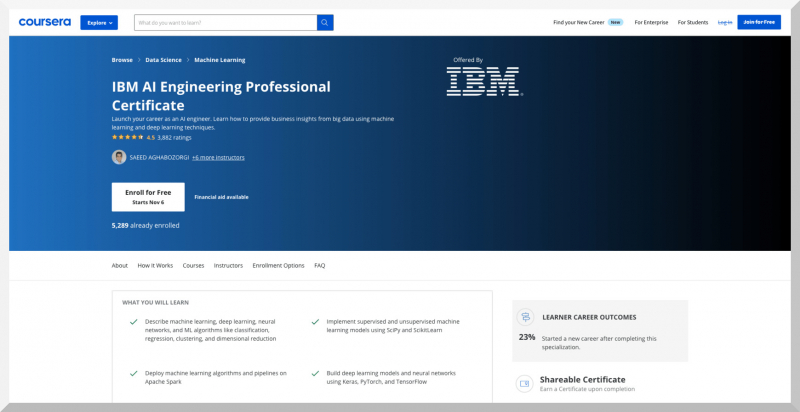
learnacourseonline.com -
There are several online courses available to learn about neural networks. This is one course, however, where students will learn from the greatest in the industry. This program is provided by DeepLearning. Andrew Ng, the pioneer of AI, created it on Coursera. Learners will start with the principles of deep learning to grasp the possibilities and challenges of deep learning models in this specialization. The students will then look at how to create and train neural network architectures like CNN and LSTMs, Transformers, and more.
Furthermore, the students will be taught how to improve these models using various tactics like as dropout, batch normalization, and Xavier/He initialization. Furthermore, students will grasp both theoretical principles and actual implementations of Python and TensorFlow for a variety of real-world issues, including speech recognition, chatbots, machine translation, and more.
The key takeaways from the course include:
- Ability to build, train and validate deep neural network models.
- Implementation of vectorized neural networks and identifying architecture patterns.
- Applying deep learning to various applications.
- Best practices and optimization algorithms.
- Strategies to reduce errors in machine learning systems.
- Perform deep learning techniques to provide end-to-end transfer and multi-task learning.
- CNN for image recognition and classification tasks.
- RNN for NLP problems and the implementation of HuggingFace Tokenizers.
The course curriculum includes the following:
- Neural Networks and Deep Learning
- Improving Deep Neural Networks: Hyperparameter tuning, Regularization, and Optimization
- Structuring Machine Learning Projects
- Convolutional Neural Networks.
Instructor: Andrew Ng, Kian Katanforoosh, Younes Bensouda Mourri
Level: Intermediate
Duration: 5 months
User Review: 4.9/5
No. of Reviews: 118,736
Price: Free Enrollment (Additional charges for certification may apply)
Website: coursera.org/specializations/deep-learning
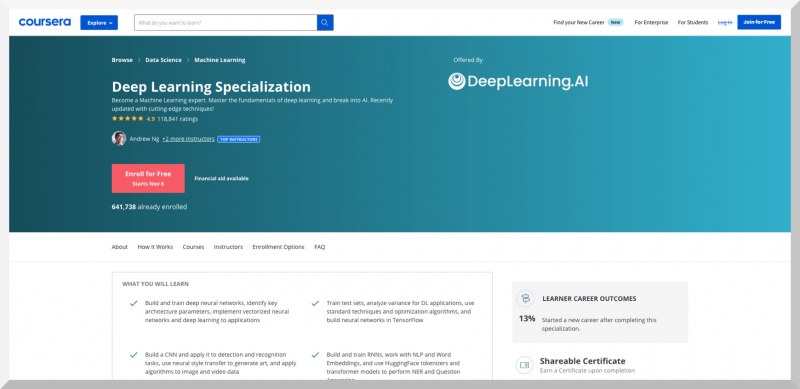
learnacourseonline.com -
This course has the highest rating on the Udemy marketplace. The main goal of this lesson is to teach students about the theoretical and mathematical concepts of neural networks. The students will first learn about important concepts including perceptrons, activation functions, and multilayer networks. Furthermore, follow-along demonstrations are provided for sophisticated concepts such as backpropagation algorithms and gradient descent. The course then continues on to the practical portion, where students will learn how to design neural networks from the ground up.
Furthermore, the students will receive valuable programming expertise using Python to create machine learning models that address a variety of data science problems. In addition, several examples and projects are provided for the most common Python libraries for developing machine learning models.The course modules are:
- Introduction
- Single Layer Perceptron
- Multilayer Perceptron
- Libraries for Neural Networks
Instructor: Jones Granatyr, JA Expert Academy and Ligency Team
Level: Beginner
Duration: 8 hours and 41 minutes
User Review: 4.7/5
No. of Reviews: 196
Price: $47.6
Website: udemy.com/course/neural-networks-in-python-a-guide-for-beginners/
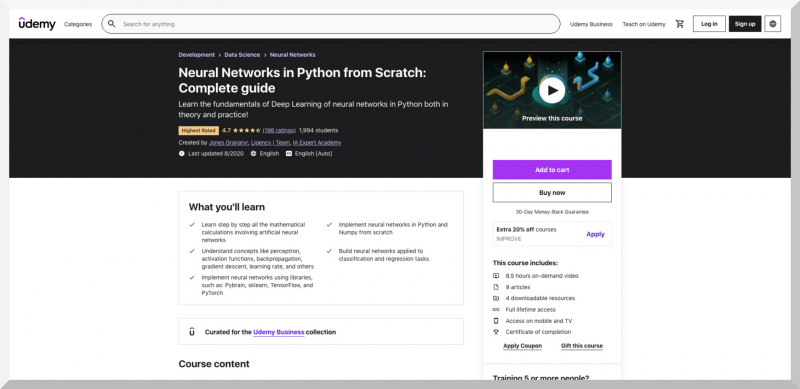
learnacourseonline.com -
On Udemy, you can take this certification course. It's one of the most popular courses on the platform. Learners will obtain adequate hands-on coding experience by learning about neural networks through six real-world projects. The students will also learn about the various tools and libraries that are used to create neural network models.
Learners will gain proficiency with deep learning concepts and understand the differences between various neural networks by the end of the course. They will also be able to apply concepts such as self-organizing maps in practice and build different models for CNN, RNN, Boltzmann machines, and Autoencoders for various problems such as image recognition, stock price prediction, financial fraud detection, and recommender systems.The course contents are:
- Introduction
- ANN
- ANN Intuition and Building an Ann
- CNN, CNN Intuition and Building a CNN
- RNN, RNN Intuition and Building an RNN
- and Improving RNN
- Self-Organizing Maps
- SOM Intuition and Building a SOM
- Mega Case Study
- Building Boltzmann Machine
- Building Autoencoders
- Regression and Classification
- Data Preprocessing Template
- Logistic Regression Implementation
- Bonus Lectures/ Machine Learning Basics
Instructor: Krill Eremenko, Hadelin de Ponteves, and Ligency Team
Level: Beginner/Intermediate
Duration: 22 hours and 37 minutes
User Review: 4.6/5
No. of Reviews: 38,607
Price: $47.6
Website: udemy.com/course/deeplearning/
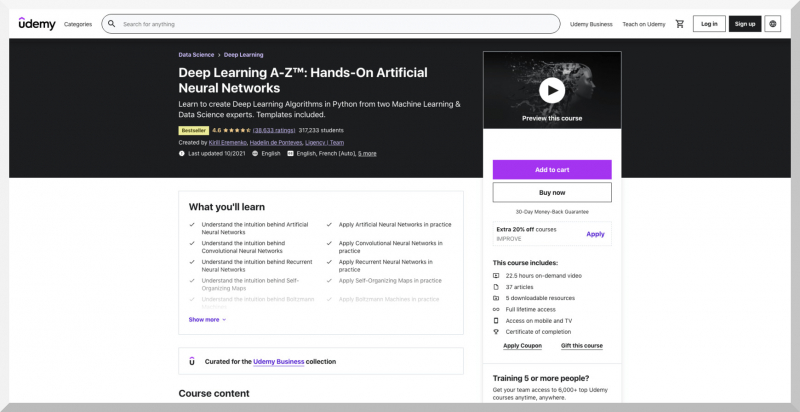
learnacourseonline.com -
This Udacity specialization course was created in conjunction with Amazon Web Services and Facebook AI. Learners will grasp neural network ideas and implementations utilizing deep learning frameworks such as PyTorch in this course. The students will also learn how to construct CNNs for image recognition and RNNs for sequence regeneration tasks. Learners will also get a deep dive into advanced concepts and models like generative adversarial networks (GAN) for picture generation, as well as learn how to deploy models.
Participants are expected to have a working grasp of Python programming and its libraries, such as NumPy and Pandas, as the program is designed primarily for intermediate learners. There are, however, additional requirements, like as knowledge of calculus and linear algebra.The course curriculum includes:
- Introduction
- Neural Networks
- Convolutional Neural Networks
- RNN
- GAN
- Deploying a Sentiment Analysis Model
Instructor: Mat Leonard, Luis Serrano, Cezanne Camacho, Alexis Cook, Jennifer Staab, Sean Carrell, Ortal Arel, Jay Alammar, and Daniel Jiang
Level: Intermediate
Duration: 4 months
User Review: 4.7/5
No. of Reviews: 2100
Price: Monthly Access: $310.8/ 4-Month Access: $1056.8
Website: udacity.com/course/deep-learning-nanodegree--nd101
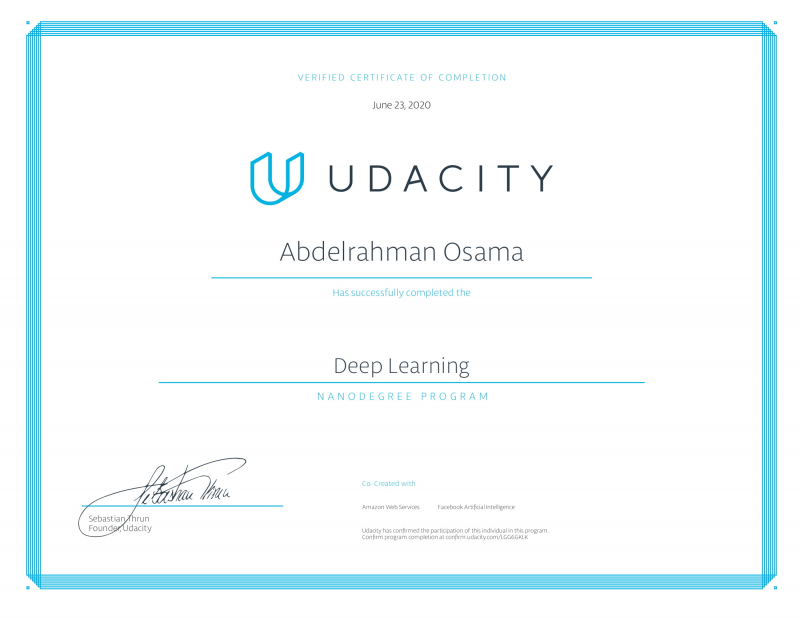
learnacourseonline.com -
Simplilearn offers this certification training program. The learners will learn best practices and grasp deep learning principles using Keras and TensorFlow in this course. The students will be introduced to several frameworks, as well as the principles of ANN, PyTorch, and Autoencoders.
In addition, the students will learn how to design models and understand the findings, as well as how to create an effective deep learning algorithm. This curriculum, on the other hand, is designed for intermediate and advanced students. As a result, participants must have a basic understanding of deep learning and programming skills.The course contents are:
- Introduction to AI and Deep Learning
- Introduction to TensorFlow
- ANN
- Deep Neural Network and Tools
- Deep Neural Net Optimization, Tuning, and Interpretability
- CNN
- RNN
- Restricted Boltzmann Machines
- Autoencoders
- Free Module: Math Refresher
- Projects
Instructor: Industry Professionals
Level: Intermediate/Advanced
Duration: 90-Days Flexible Learning
User Review: 4.6/5
No. of Reviews: 1657
Price: $272
Website: simplilearn.com/deep-learning-course-with-tensorflow-training
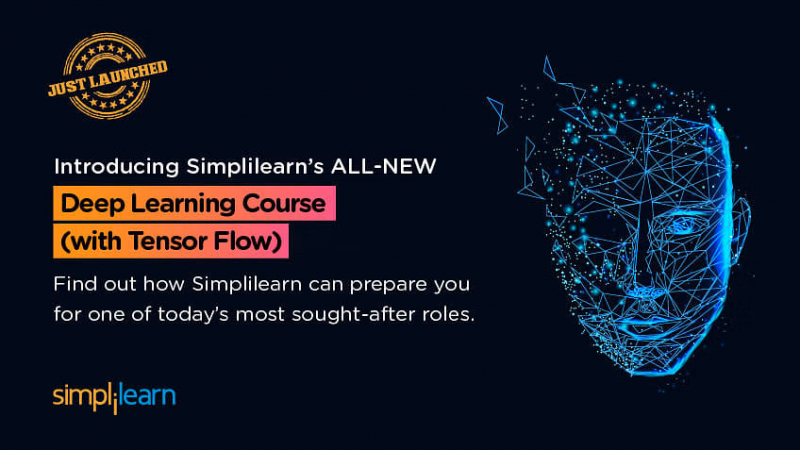
learnacourseonline.com 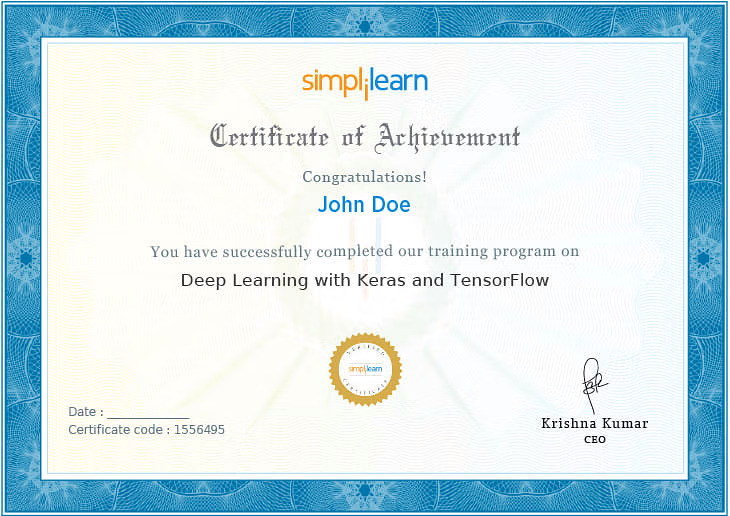
learnacourseonline.com -
This deep learning course delves into AI and shows how neural networks may be applied to a variety of fields, with a concentration on financial applications. It can be found on the edX platform. To recognize various features, the students will study various deep learning algorithms, data sources, photos, and finance literature. Learners will be able to use neural networks and deep learning techniques to develop prediction models in finance by the end of this course.
Furthermore, the students will understand how to use data from multiple sources and apply techniques such as image recognition and natural language processing (NLP) to make predictions. Finally, the students will gain advanced programming abilities to create neural network models for complicated challenges such as portfolio management and optimization, risk management, and expediting other AI-related financial activities.
The course modules are:
Week 0: Classical Machine Learning: Overview
- Guided entry for students who have not taken the first course in the series
- Notational conventions
- Basic ideas: linear regression, classification
Week 1: Introduction to Neural Networks and Deep Learning
- Neural Networks Overview
- Coding Neural Networks: Tensorflow, Keras
- Practical Colab
Week 2: Convolutional Neural Networks
- A neural network is a Universal Function Approximator
- Convolutional Neural Networks (CNN): Introduction
- CNN: Multiple input/output features
- CNN: Space and time
Week 3: Recurrent Neural Networks
- Recurrent Neural Networks (RNN): Introduction
- RNN Overview
- Generating text with an RNN
Week 4: Training Neural Networks
- Backpropagation
- Vanishing and exploding gradients
- Initializing and maintaining weights
- Improving trainability
- How big should my Neural Network be?
Week 5: Interpretation and Transfer Learning
- Interpretation: Preview
- Transfer Learning
- Tensors, Matrix Gradients
Week 6: Advanced Recurrent Architectures
- Gradients of an RNN
- RNN Gradients that vanish and explode
- Residual connections
- Neural Programming
- LSTM
- Attention: introduction
Week 7: Advanced topics
- Natural Language Processing (NLP)
- Interpretation: what is going on inside a Neural Network
- Attention
- Adversarial examples
Instructor: Ken Perry
Level: Intermediate
Duration: 7 weeks
User Review: NA
No. of Reviews: NA
Price: Pricing details available on Sign-Up
Website: edx.org/course/deep-learning-and-neural-networks-for-financial-engineering
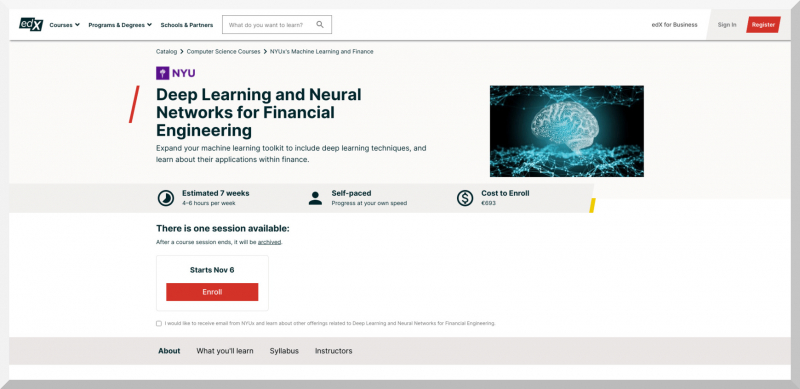
victorytale.com -
This course is available through Udemy. The course is designed to teach students about deep learning architectures, particularly RNN. Learners will understand how RNN is used for sequence modeling as well as its applications in time series analysis, forecasting, and NLP. The learners will learn the principles of machine learning, neural network topologies, and essential ideas of neural networks for classification and regression in this course. In addition, the students will learn about sequential data, time-series data, and how to develop text data models for an NLP problem.
The learners will also learn about the steps of RNN construction using TensorFlow, as well as the applications of GRU and LSTM. The students will next learn how to use TensorFlow to develop a model for time series forecasting, which will include tasks such as stock price prediction and text classification using RNN with features such as spam detection, sentiment analysis, and parts-of-speech tagging. Finally, the students will learn how to leverage TensorFlow's embedding for NLP.
The course contents include:
- Introduction
- Google Colab
- Machine Learning and Neurons
- Feedforward ANN
- RNN, Time Series, and Sequence Data
- NLP
- In-Depth: Loss Functions
- In-Depth: Gradient Descent
- Extras: Setting up the Environment/ Extra Help with Python Coding/ Effective Learning Strategies for Machine
- Learning
- Summary
Instructor: Lazy Programmers Inc.
Level: Intermediate
Duration: 11 hours and 49 minutes
User Review: 4.6/5
No. of Reviews: 3447
Price: $47.6
Website: udemy.com/course/deep-learning-recurrent-neural-networks-in-python/
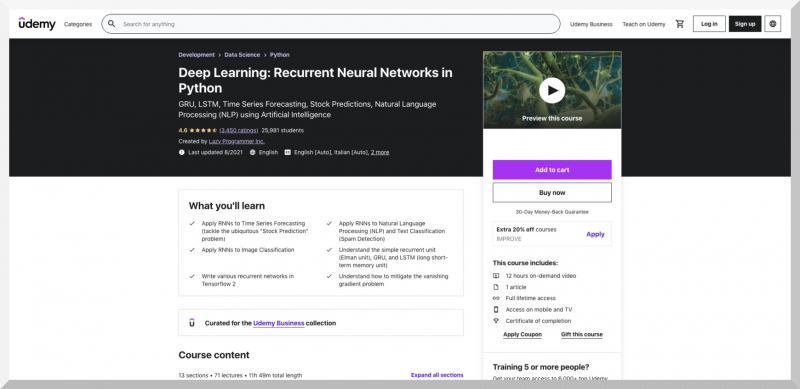
learnacourseonline.com -
Edureka has a certification course accessible. Using the TensorFlow 2 Python library, learners will master a variety of prominent algorithms such as CNN, RCNN, RNN, LSTM, and more. There are also real-time initiatives such as mood and gender detection, as well as automatic image captioning. The students will also be comfortable writing TensorFlow code to create deep learning models for text and picture processing.
The fundamentals of a single layer and multilayer perceptron, as well as CNN methods for image processing and classification, will be covered. Furthermore, advanced concepts such as transfer learning, RCNN, ROI, Pooling, Faster RCNN, and Mask RCNN are comprehensively covered through hands-on demonstrations. Finally, the learners will be aware of concepts like Boltzmann Machine and Autoencoders and the uses of GAN in the modern AI industry. The course curriculum includes:
Introduction to Deep Learning
- Getting Started with TensorFlow 2
- CNN
- Regional CNN
- GAN
- Emotion and Gender Detection
- Introduction to RNN and GRU
- LSTM
- Auto Image Captioning using CNN and LSTM
Level: Intermediate
Duration: 5 weeks
User Review: 5/5
No. of Reviews: 20,000
Price: $272
Website: edureka.co/ai-deep-learning-with-tensorflow
slideshare.net -
This course is available on Coursera from the University of Colorado Boulder. Computer vision as a topic of study and research is the emphasis of the curriculum. First, the students will study how computer vision tasks are carried out and the methodologies for model development that are recommended. Following that, the students will learn about deep learning techniques and how to apply them to computer vision challenges. The students will also learn to examine the results as well as the benefits and drawbacks of various strategies.
Finally, the students will participate in hands-on training to learn how to develop models using machine learning tools and libraries. Using advanced neural networks constructed from the ground up, the students will conduct image classification, object identification, object segmentation, facial recognition, and activity and position estimation tasks.The course modules are:
Introduction and Background
- The first module introduces the field of computer vision and how information can be extracted from images. Furthermore, the learners will cover the primary categories of tasks in computer vision. In addition, the learners will understand how deep learning techniques impact the field of computer vision.
Classic Computer Vision Tools
- The second module allows learners to explore various computer vision tools and techniques, and concepts on convolution operation, linear filters, and algorithms for feature detection and image detection.
Image Classification in Computer Vision
- In the third module, the learners will review the challenges in object recognition in the classic computer vision approach. Next, the learners will understand the necessary steps to perform object recognition and image classification tasks using the computer vision pipeline.
Neural Networks and Deep Learning
- The fourth module focuses on the image classification pipeline using neural networks. The learners will understand the differences between common problems and computer vision problems with neural network models.
- The essential components of neural networks are covered in-depth and practical sessions cover the implementation of neural networks for image classification using TensorFlow.
CNN and Deep Learning Advanced Tools
- The final module provides learners with the concepts of various CNN components, including parameters and hyperparameters in a deep neural network. The learners will also cover essential concepts on improving the accuracy of the deep learning models and the essential factors in improving the overall performance of these models. Furthermore, the project in this module requires learners to build and train a deep neural network for image classification.
Instructor: Ioana Fleming
Level: Intermediate
Duration: 22 hours
User Review: NA
No. of Reviews: NA
Price: Free Enrollment (Additional charges for certification may apply)
Website: coursera.org/learn/deep-learning-computer-vision
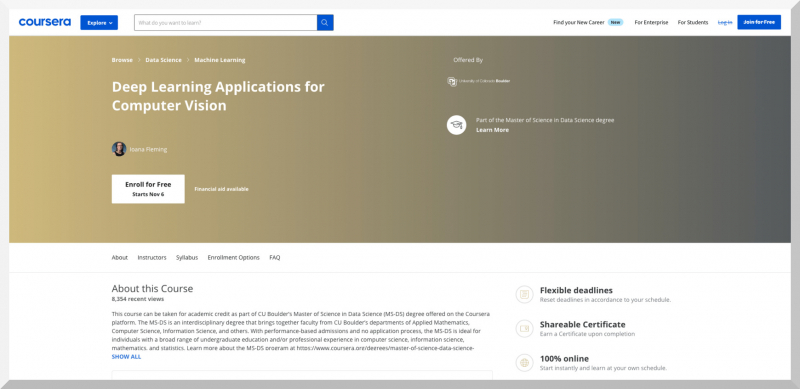
learnacourseonline.com 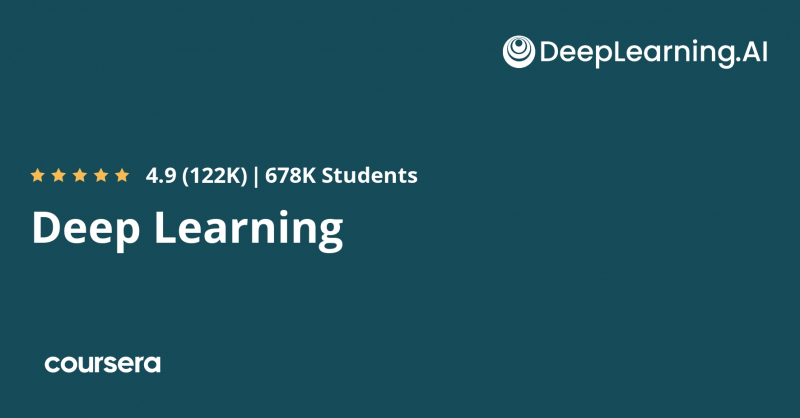
coursera.org





























